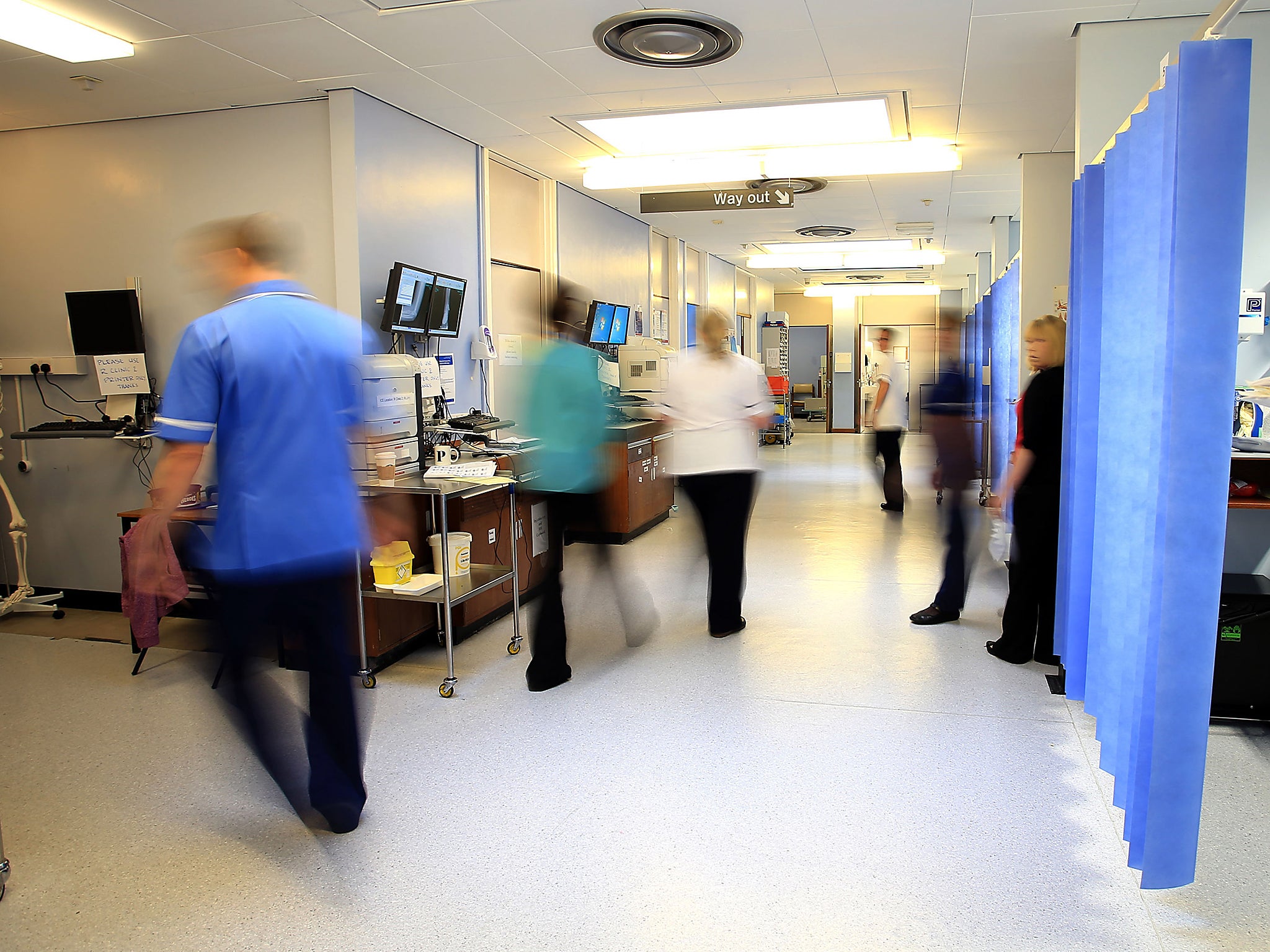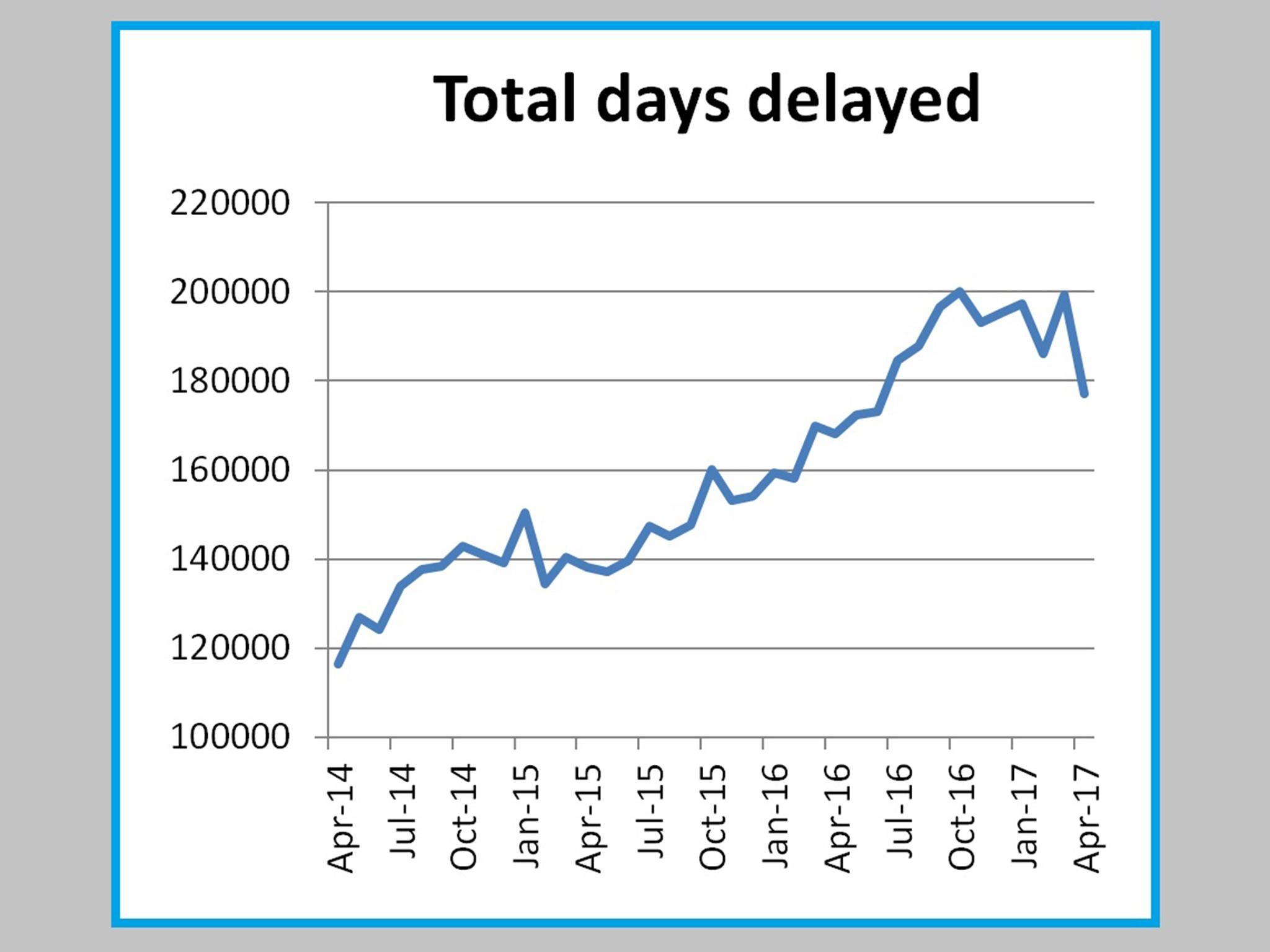Bed-blocking up by 52 per cent in three years, NHS figures show
Opposition politicians, charities and union leaders call on Theresa May to step in with extra funds to tackle delayed transfers of care

Bed-blocking in NHS hospitals has risen by more than half in the last three years, according to new figures.
Patients in England experienced some 177,000 days-worth of delays affecting more than 5,900 beds a day in April this year, NHS England said, leading opposition politicians, charities and union leaders to call on Theresa May to step in with extra funds.
Data on delayed transfers of care – the official term for bed blocking, when a patient is fit to be discharged or moved to a less acute stage of treatment but there is nowhere to receive them – was released following the general election.
It showed the tally of total delayed days had risen from 116,261 in April 2014 to 177,137 three years later, an increase of about 52 per cent. Estimated actual beds blocked rose from 3,875 a day in April 2014 to 5,905 in April this year.
Norman Lamb, the Liberal Democrats’ health spokesman, called the rise “shocking” and said Ms May's new administration should “establish, without delay, a cross-party commission on the NHS and care”. “This transcends narrow party politics,” he told The Independent.
Nigel Edwards, the chief executive of the Nuffield Trust charity, told The Independent the Government must provide “provide adequate and sustainable funding for the NHS” to tackle delayed transfers.
Labour demanded “a major and immediate funding boost” and Dr Mark Porter, the chairman of the British Medical Association council, said: “The new government cannot ignore this crisis any longer.”
Fifty-five per cent of delays in April 2017 were down to the NHS internally and a further 38 per cent were attributable to social care, NHS England said, with the blame shared in the remaining cases.

The body admitted the proportion of delays due to patients lacking a home care plan “has been steadily increasing since February 2015”, and said 36 per cent of all social care-related delays in April, or 23,900 days-worth, were for this reason.
The authority said: “The main reason for NHS delays in April 2017 was ‘patients awaiting further non-acute NHS care’. This accounted for 28,500 delayed days [or] 29.3 per cent of all NHS delays.”
When beds are taken up by patients who have not been discharged it means other people coming into accident and emergency, who may be more unwell, cannot be moved into wards or departments elsewhere in the system.
The problem was projected to cost the NHS £169m directly for the 2016-17 financial year, but the National Audit Office believes the overall related cost may reach some £820m annually, according to David Hare, the chief executive of NHS Partners Network.
The future of social care and the NHS was a central issue in the general election, with Jeremy Corbyn and Theresa May having faced off for months over funding and the pressure that bed-blocking puts on A&E departments, particularly during winter.
Local authorities across the country have raised council tax to help fund the care system and Chancellor Philip Hammond pledged an extra £2 billion over three years in his budget in March.
Mr Lamb told The Independent: “The shocking rise in bed-blocking reinforces the case we have been making for the Government to establish, without delay, a cross party commission on the NHS and care. We need a new Beveridge report for the 21st century.
“The new Government must commit to giving the NHS and social care the extra money they need in order to put an end to this totally unacceptable situation.”
Jonathan Ashworth, Labour's Shadow Health Secretary, told The Independent: “Theresa May's weak and unstable leadership is proving disastrous for the NHS with standards for NHS patients getting worse and worse, and it is astonishing that so many more people are stuck in hospital even when they're well enough to go home.
“The NHS needs a major and immediate funding boost so that hospitals are able to deliver the best possible standards for patients.”
Mr Edwards, of the Nuffield Trust, said: “The poor availability of social care services is a growing part of the problem. But most delays are still due to issues within the NHS, whether this is a lack of NHS community services closer to people's homes, inadequate systems and process within hospitals, or simply not having the right staff in the right places.
“The NHS and local authorities are already working together to shift more care out of hospital. But without additional funding for this change, and with problems in recruiting and retaining staff likely to get worse under Brexit, this will be an uphill struggle.
“So, as well as looking at why so many people are stuck in hospital and unable to leave, the new Government must both provide adequate and sustainable funding for the NHS and ensure any Brexit deal means the health service can continue to access to the staff and skills it needs.”

Emily Holzhausen, the director of policy at Carers UK, told The Independent: “Investment in care services, which have been consistently underfunded, must be high up on the new government's agenda.
“A lack of consultation at the point when their loved one is discharged from hospital, or an inadequate support package at home, mean that many families are taking on a caring role in a crisis and feel unprepared. This inevitably leads to people being readmitted to hospital, piling more pressure on the already stretched NHS.”
Dr Porter, of the BMA, added: “These figures show the worrying reality of an overstretched NHS with restricted funding and resources, failing to meet unprecedented demand.”
The Conservatives referred The Independent to the Department of Health for comment, who referred us to NHS England. NHS England has been contacted for comment.
Join our commenting forum
Join thought-provoking conversations, follow other Independent readers and see their replies
Comments
Bookmark popover
Removed from bookmarks